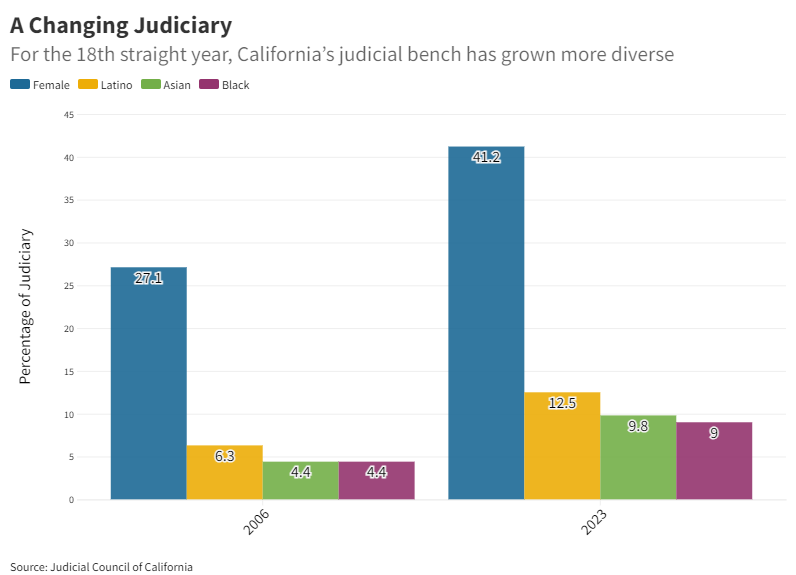
Celebrating LGBTQ+ Diversity in the California Courts: Los Angeles County Judge D. Zeke Zeidler
This June, California courts and the Judicial Council of California join the nation in recognizing LGBTQ+ Pride Month. We've spoken with a few of our LGBTQ+ identifying judges and justices about their experiences serving on the bench and how increasing diversity serves the courts and the public.
In 2004, Judge D. Zeke Zeidler was the first openly gay man initially elected to the Superior Court of Los Angeles County. Judge Zeidler had previously been appointed as a Juvenile Court Referee in 1998 and continues to focus on juvenile issues. He is a former president of the International Association of LGBTQ+ Judges.
Following are video highlights and excerpts from a conversation with Judge Zeidler:
*The text of the interview has been edited for length and clarity.
On the importance of diversity in California courts:
"People often don't understand the full nature of diversity on the bench, because people often just talk about walking into a courtroom and seeing someone who looks like you. But diversity on the bench, from a judicial standpoint, also means we have judges involved in statewide committees working on policy, legal forms, and rules of court. I've been lucky enough to work with Judge [Victoria] Kolakowski, Judicial Council staff, and others on ways to ensure that our court forms are gender neutral.
Because I do trainings on LGBT issues, I have judges who call me and say 'I'm about to start a trial with a hate crime case with a transgender litigant. Is there anything I should be asking in voir dire?' Having a colleague who is gay, lesbian, bisexual, transgender, or nonbinary is something that educates judges and changes their view of the cases and parties before them.
A big part of judicial ethics is about treating people with dignity and respect and ensuring others are too. The court deals with people from every walk of life. In every single county in California, we have same-sex couples who are married and/or are raising children, who come to the court to help resolve any issues they have. Understanding the litigants who come before us is a major part of the judicial branch’s dedication to diversity and inclusion."
On access to justice:
"I'm lucky enough to have gotten involved very early in statewide judicial education around fairness, ethics, bias, and antibias work. It was [San Francisco County] Judge Donna Hitchens who worked to make sure the Judicial Council's Advisory Committee on Providing Access and Fairness was addressing sexual orientation. They had the Krieger Sexual Orientation Fairness Subcommittee, but they also had various subcommittees related to women's issues, women of color, and racial equity. I've had the honor of carrying that work forward.
We created a bench card for judicial officers dealing with LGBT youth issues under the leadership of [San Francisco County] Commissioner Catherine Lyons.
I'm making sure that New Judicial Officer Orientation continues to have segments related to LGBT awareness, diversity, and antibias. I’ve done video trainings on sexual orientation issues and more recently on transgender issues.
In [Los Angeles Superior Court], we created two trainings on transgender issues, one of which was offered throughout the county, with 12 different offerings at different court sites. We hit more than 230 judicial officers with in-person training on transgender issues co-taught by a judicial officer at their courthouse and a judicial officer who identifies as LGBT.
In the most recent statewide video program that we did on transgender issues, I was talking about ways to make transgender litigants feel comfortable in court, letting a court know how they would like to be addressed. I had been thinking recently about adding my pronouns on my nameplate on my bench, and ended up writing an article about the concept. We now have judges throughout the United States and Canada who have their pronouns on their nameplates as a way to ensure litigants are able to feel comfortable telling a judicial officer how they'd like to be addressed."
On coming out as LGBTQ+:
"When I was in high school, I participated in a week-long summer camp dealing with antibias, racism, sexism, and homophobia. This was in the very early 1980s and that gave me the ability to really understand diversity and understand the privilege I have as a White man in society, and how to deal with my own coming-out issues.
I came out at a pretty young age on the front page of my college newspaper and within a year was associated students president, which taught me that coming out is not always going to end up being a bad thing and letting people know who you are and sharing your authentic self can make positive change.
When I was beginning as an attorney, I had to decide whether to put LGBT involvements on my resume. As I often tell law students, 'If they wouldn't hire you because of your LGBT involvements on your resume, would you really want to work for them?'"
On role models and mentors going into the legal profession:
"When I became a lawyer, there were just a handful of LGBT judicial officers in the state. [Retired Los Angeles County Judge] Steve Lachs was the first openly gay judge in the world. When he was appointed to the bench by Jerry Brown in the late 1970s, the newspaper headline in the Los Angeles Times was something like 'Governor Appoints Avowed Homosexual to the Bench.' I remember as a law student or young lawyer calling Judge Steve Lachs on the phone and halfway through the call, realizing he was sitting on the bench talking to me--he was larger than life.
It's always been important for me to reach out to law students, lawyers, and judicial officers. My husband and I for 15 years have hosted the Rand Schrader Law student reception for LGBT law students throughout the greater Los Angeles area. Every year, there are one or two students I talk to who are interested in my area of law (juvenile dependency) or being on the bench, and I invite them to come watch me in court. It is amazing to me the impact it has on a law student to have that type of interaction with the judge.
I was meeting with lawyers and advocates from China and they asked me 'What can we do to make a difference in the system?' I said they need to find a judge who's an ally and work with them to make headway. They looked at me and said 'In China, we don't interact with judges. We don't have a way to meet a judge.' So we have such an opportunity in our society to mentor and interact with the next generation and our peers."
On working in juvenile justice:
"Since I got on the bench in 1998, Los Angeles Superior Court’s juvenile division has always had three to five openly gay, lesbian, or bisexual judicial officers. So many of us want to be there for young people and families who have experienced fear and adversity and have struggled with acceptance.
The number of openly LGBT youth in foster care and in the child welfare system is so high.
I always tell judges if the parent and child have a conflict and it's not totally clear exactly what's going on, start asking questions to see if it has to do with the parent perceiving the child to be gay or trans. Maybe that's the issue that no one's catching. In juvenile dependency court, we're dealing with families where parents have problems and kids need security, safety, and planning for their future."
On the role of judges:
"I want to give a shout out to retired [California] Chief Justice Ron George. I was teaching a New Judicial Officer Orientation class the week of the Prop. 8 election. The California Supreme Court had already ruled that in California, same-sex marriages had to be recognized, but the voters ended up knocking that down.
I was in chambers with a new group of judges the day after the election and I told Chief Justice George I had recently been in a program where we were listing our heroes and that his name was on the list. Doing the right thing as a judicial officer, especially when there's so much chance of public outcry, really does take courage.
A lot of judicial officers in this state and in this country have had so much courage. There was a judge in Sacramento dealing with whether California's domestic partnership law violated a previous initiative that banned same-sex marriage in California and he faced threats of recall if he upheld California's domestic partnership law. He decided that the correct ruling in the case was that California's domestic partnership law was constitutional and valid.
When it went to the Court of Appeal, those appeals court justices faced those same threats and they still followed the law. I'm not saying you always rule in favor of an LGBT issue or any issue dealing with diversity, but the courage it takes to follow the law when you're ruling in those types of cases is really something that I think judges don't get enough credit for."




